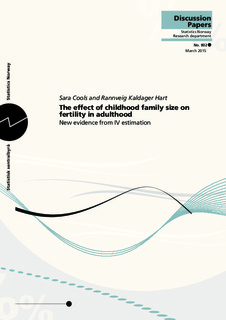The effect of childhood family size on fertility in adulthood. New evidence from IV estimation
Working paper
Published version
Permanent lenke
http://hdl.handle.net/11250/2627614Utgivelsesdato
2015-03Metadata
Vis full innførselSamlinger
- Discussion Papers [1003]
Sammendrag
While fertility is positively correlated across generations, the causal effect of children's experience with larger sibships on their own fertility in adulthood is poorly understood. Using the sex composition of the two first-born children as an instrumental variable, we estimate the effect of sibship size on adult fertility. Estimations are done on high-quality data from Norwegian administrative registers. Our study sample is all first- or second-borns during the 1960s in Norwegian families with at least two children (approximately 110 000 men and 104 000 women). An additional sibling has a positive effect on male fertility, both by shifting some men into fatherhood and increasing family size. For women, a negative quantum effect emerges, driven by a preference for two rather than three children among women from three-child families. Studying mediators we show that mothers of girls shift relatively less time from market to family work when an additional child is born. We speculate that this scarcity in parents' time makes girls aware of the strains of life in large families, leading them to limit their own number of children in adulthood.
